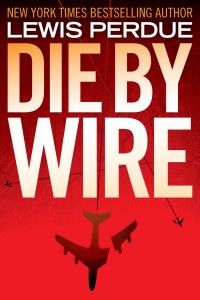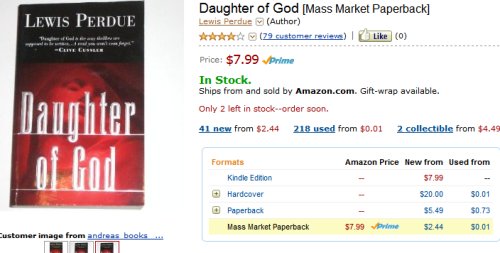Why Would A NYTimes Bestselling Author Go Indie? (Losing A Million Dollars Is Just The Start)
 People have asked me: why have I decided to go indie with Die By Wire. Why — when I have had books that made the NYTimes, USA Today and other bestseller lists the old, traditional, legacy way — did I decide to take this course?
People have asked me: why have I decided to go indie with Die By Wire. Why — when I have had books that made the NYTimes, USA Today and other bestseller lists the old, traditional, legacy way — did I decide to take this course?
Well, to start with, I’ve already lost a million dollars with a legacy publisher. And maybe more, but I’ll never know given the obscurity and dog-in-the-manger secrecy of the industry’s accounting.
Some of my other answers are below.
Die By Wire is my first independently published original novel.
Over the past couple of years, I’ve obtained the rights back from most of my other books and with the help of William my secret weapon, have made them available as e-books and, in some cases, as quality-format paperbacks available through Amazon’s Createspace service or through Google Books. (You can find a list of all those at Lew’s Books.)
In addition, the experience of my friend Lee Goldberg and colleagues Barry Eisler and Joe Konrath have encouraged me. They all have explained their own reasons on their sites.
This piece – Barry Eisler Explains Self-Publishing Decision – from The Daily Beast, explains much of my inspiration and deals with a lot of overall industry details.
PUBLISHERS GREAT, GOOD, BAD, UGLY, WORSE
I’ve been fortunate. And not so much.
I’ve had bestselling books via the legacy process as far back as the early 1980s and as recently as 2005.
The first publisher earned it. The second one simply piggybacked on my earlier success.
That first publisher (the former Pinnacle Books) went Chapter 11 just two weeks after my accountant showed up at their door to audit my royalty account. Might have been coincidence, but even the beginning of the audit showed the company owed me just a hair under a million dollars. Obviously they couldn’t pay it then and never did.
Despite that debacle, I was fortunate to have had superb editing (Patrick O’Connor & Kathy Gordon) and promotional support that was stunningly good. By the time Pinnacle Books went belly up, my thriller, The Delphi Betrayal, had sold more than 750,000 copies. And that was just what they would admit to.
KEEP BOOKS IN STORES SO YOU CAN SELL BOOKS IN STORES
Some of my early bestseller success was due to having written a pretty good (and well-edited) book. And a lot of the success came from great publicists, superb distribution, creative marketing, and a killer sales team (headed by Jim Redam).
All that made it impossible to go into a book store, news stand, airport or grocery store without seeing my first bestseller, The Delphi Betrayal on the shelves and racks.
A succession of new printings meant that they didn’t run out of books. In other words, they were smart enough to recognize that you needed to have books in the store in order to sell books in a store.
Seems pretty basic, but many legacy publishers (including those selling hard copy through Amazon) are still struggling to get their minds around the rocket science behind that concept.
PUBLISHING SUCCESS MURDERED BY CORPORATE RAIDERS
Other bestsellers followed The Delphi Betrayal: Queensgate Reckoning and then The Da Vinci Legacy. My fourth book with them, The Tesla Bequest, barely got into the stores before Pinnacle died. Despite the fact that the company was on its deathbed, The Tesla Bequest sold out its first printing of more than 100,000 copies and then sales died with the company itself.
At the same time, the .357 Vigilante series (re-titled The Jury series) also died. Fortunately Lee Goldberg resurrected that series and has turned it into an Amazon indie ebook hit … which is further proof that going indie shows just how short-sighted legacy publishers can be (white cane anyone?)
Pinnacle Books failed not because it was unsuccessful, but because it had been ambushed by corporate raiders.
Pinnacle bled to death because its assets were looted in a corporately legal but ethically questionable scheme. Michigan General, a penny-stock insurance company, used a leveraged buyout scheme to suck the cash out of Pinnacle, essentially stealing my money and that of hundreds of other authors.
A leveraged buyout is where a group of unscrupulous yahoos with no money of their own borrow money from other unscrupulous yahoos (usually banks), then promise to pay back the loan using the cash and other assets already owned by the unfortunate company being taken over. Once the takeover target has its assets looted, it then struggles to survive. Some do. Many don’t.
At the very least I decrease the risk of that. After all, Amazon’s not likely to go belly-up any time soon. That’s a lot more than you can say about any number of today’s financially uncertain legacy publishers, distributor and book stores.
FUNKY ACCOUNTING & NO TRANSPARENCY
Transparency is non-existent with legacy publishing companies. Everything is concealed behind a Wizard of Oz curtain. What are they afraid of? Is it that their accounting is still stuck in the 19th Century, or that they simply want the freedom to be sneaky and, occasionally, dishonest?
One big example: royalty statements from legacy publishers typically appear a year or so after the books concerned are sold. But only in six-month time periods unrelated to when the book is first sold. Clear?
Yep, clear as Hollywood accounting.
And years after a book has earned out its advance, and even when the royalty statements show continued sales, somehow publishers fiddle the books to avoid paying money owed.
There are enough accounting loopholes and antiquated practices to make Bernie Madoff flinch. Not only that, but publishers NEVER, EVER tell you how your book is selling. No numbers.
But Amazon, the iBookstore, Nook, Smashwords and others give me instant access to sales statistics and pay promptly. Funny what kind of good can happen when you actually use technology invented in the last half of the last century to run your accounting.
CHANGE OR DIE
The world changes. In fact, the only organisms or systems that don’t change are the ones that are dead. The publishing industry and book stores, like music and movies before them, has been slow to embrace or even deal with the digital revolution that started toward the end of the last century.
One thing I learned from bestsellers at Pinnacle was the value of promotion, creative marketing, proper distribution and learning who your customers are and how to reach them. Sadly, too many publishers seem to have lost sight of that. To their detriment and to their authors’.
I learned this at my last publisher when they went through four publicists (who left for better jobs) during the time when Perfect Killer launched. Never in the course of 20 books had a publisher failed to get review copies to Publisher’s Weekly, Library Journal and Kirkus Reviews. All of my books had received great, starred reviews.
But the Perfect Killer publicist turnover meant they missed two of those three. Many other dropped balls (including the inability to utilize a real-life custom wine to bring to life a fictional one created in the book) convinced me that they had abrogated one of the key duties of a publisher.
Hell, I figured that I couldn’t do worse even if I did nothing. Thus, another brick in the pavement toward independent publishing.
HIGHWAY ROBBERY ON E-ROYALTIES
Legacy publishers typically offer 17.5 to 25% royalties. I make 70% doing it myself. Plus, once a publisher has your ebook rights, they own you forever. That differs from print publishing where — if the book goes out of print for a certain period of time — the author typically gets the rights back.
But an ebook never goes out of print, so the publisher locks up your work forever, no matter how pathetic they might be at selling it.
AWOL LEGACY PUBLISHERS
Increasingly publishers don’t promote, don’t edit and don’t develop authors. All that falls on the shoulders of the author. So, if we have to do that anyway, why do we need a publisher?
In addition, the three books I still have in print with a t legacy publisher keep going out of print.
I have offered — at my expense — to turn all of the books into hard-copy books using Amazon’s Createspace print-on-demand service. And I’ve offered to share the net with them.
Amazingly, the publisher won’t even discuss the option. That means that Amazon customers and those in physical book stores have no option but to buy used copies. I am astounded how publishers would rather lose sales than actually do their jobs … which is to publish.
CLUELESS EBOOK PRICING
The pricing is all screwed up too. Just look at this recent screen capture from Amazon: It’s INSANE to price the ebook and the paperback the same. It’s just clueless marketing given that the paperback costs money to publish and the ebook costs nothing.
 With print sales dropping and ebook sales rising, the entire landscape is changing. Publishers have shown that they do not yet know how do deal sanely or intelligently to the changes.
With print sales dropping and ebook sales rising, the entire landscape is changing. Publishers have shown that they do not yet know how do deal sanely or intelligently to the changes.
I do believe that an enlightened cadre of publishers will arise from this chaos and will be able to work intelligently and fairly with authors.
Having been the beneficiary of a good publisher and a victim of the bad, I recognize the advantages of having a publishing house that actually earns the money they make from me.
I do look forward to that.

